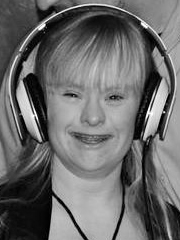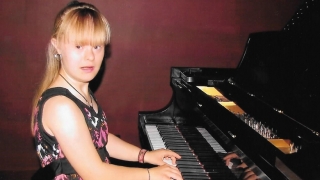It takes a special person to persevere through complicated cardiac surgery at 2 months old, type 1 diabetes at 8 years old, tonsillectomy/adenoidectomy at 11, celiac disease at 12, sleep apnea at 17, and ongoing anxiety disorder, obsessive-compulsive disorder and specific phobias. Meghan Kensil is, indeed, a special person.
“Her upbeat attitude keeps me going,” says Meghan’s mother, Cheryl. “When I feel overwhelmed, I look at Meghan and think, ‘If she can do it, so can I.’ Whatever happens, she rolls with the punches.”
 One other thing: Meghan was born with Down syndrome and was one of the first patients to come to The Children’s Hospital of Philadelphia Trisomy 21 Program and clinic when it started in 2003.
One other thing: Meghan was born with Down syndrome and was one of the first patients to come to The Children’s Hospital of Philadelphia Trisomy 21 Program and clinic when it started in 2003.
“We are a team,” Cheryl says of the T21 Program staff of physicians, nurses, social workers, and physical, occupational and speech therapists. “It definitely takes a team effort to raise a child with Down syndrome; you can’t do it alone. We depend on each other. I look to them for guidance, and they look to parents to learn more about our children.
“Especially at the beginning, the doctors were sort of learning from our children and our families. We were the experts. The program has always been comprehensive, including physical, emotional, behavioral and educational goals.”
The T21 Program serves as the hub of the wheel of Meghan’s care, with Dentistry and Oral Surgery (Lawrence Levin, DMD, MD), Endocrinology (Craig Alter, MD), GI (Edisio Semeao, MD), Child and Adolescent Psychiatry and Behavioral Sciences (Katherine Dahlsgaard, PhD), Pulmonology and the Sleep Center (Suzanne Beck, MD) as the spokes.
Clinicians in the Diabetes Center helped Meghan learn how to use her insulin pump and glucose monitor. “She does it mostly herself,” Cheryl says. “I help her count the carbs, but she can plug in the numbers and prick herself to check her blood sugar.”
It was Mary Pipan, MD, T21 Program director, who recommended a sleep study in August 2013, which showed Meghan had severe sleep apnea. Now Meghan wears a continuous positive airway pressure (CPAP) mask and breathing machine while she sleeps.
When Meghan’s anxieties began in March 2013, Cheryl turned to the clinic and received a referral from its speech therapist to Dr. Dahlsgaard. Meghan is Dr. Dahlsgaard’s first patient with Down syndrome, and the counseling, along with medication, is helping. “We couldn’t find anyone to treat her before Dr. Dahlsgaard stepped up,” Cheryl says. “Meghan’s been going to her one or two times a week, and Meghan’s OCD has definitely improved.”
 Meghan, now 18, is mainstreamed at her local high school, taking the bus with her peers every day. She is also the basketball manager at her school. She is very active and loves dancing, swimming and softball, and playing with her young cousins.
Meghan, now 18, is mainstreamed at her local high school, taking the bus with her peers every day. She is also the basketball manager at her school. She is very active and loves dancing, swimming and softball, and playing with her young cousins.
Because the T21 Program sees adults in addition to children, Meghan will always have a home at CHOP — even when she transitions to specialists who treat adults for some of her ongoing conditions.
“The T21 Clinic and Dr. Pipan are our home base for everything that has come and that may come,” Cheryl says. “It’s always where we start, no matter the issue. We feel very safe and cared for at CHOP.”